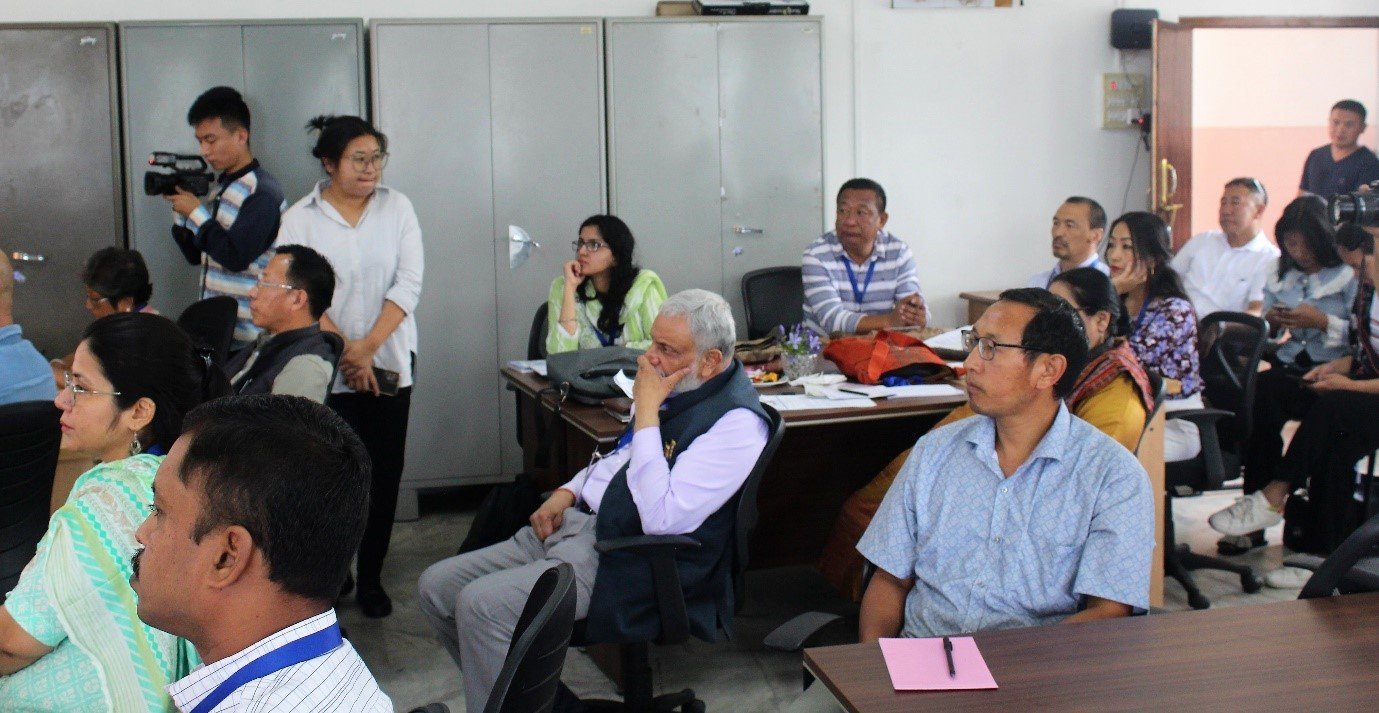The inaugural programme of the four-day regional workshop on ‘A study of School Assessments & Examination Practices and Equivalence of Boards’ initiated by Nagaland Board of School Education (NBSE) in collaboration with PARAKH – a constituent unit of National Council of Educational Research and Training (NCERT), New Delhi was held today at NBSE Conference Hall, Kohima.
Addressing the gathering, Special Guest Kekhrielhoulie Yhome, Advisor for School Education and SCERT, said that NCERT as a parent body has been fostering growth of education in the region. He mentioned that India, being a liberal minded country, should make open access education policy considering the states in the country that are unable to keep up with the knowledge exportation model followed by NCERT.
He further stated that the implementation of NEP 2020 in Nagaland is demanding particularly due to the existence of diverse languages which is more than 20 languages excluding the interiors. The advisor further pointed the need to focus on merging indigenous crafts and other practices in the existing education system.
Download Nagaland Tribune app on Google Play

Asano Sekhose, Chairperson, NBSE in her welcome note mentioned that the Performances Assessment, Review and Analysis of Knowledge for Holistic Development (PARAKH) with the basic objectives of setting norms, standards and guidelines for students assessment and evaluation for all recognised school boards of India is timely and it will help the North Eastern Boards to share their best practices to ensure equivalence of academic standards among learners across all school boards.
She informed that the focus of assessment and examination with the implementation of 2020 National Education Policy (NEP) is shifting to competency-based testing to promote critical thinking skills to test the core competences of the students. NEP aims to provide more opportunities for students to improve their performance in examinations, Sekhose added.
The chairperson also informed that the NBSE has revised its existing rules to align with NEP 2020 by incorporating new provisions in the conduct of examinations to make assessment more student friendly and affirmed that the four-day workshop will be meaningful learning experience that will enrich the participants with the best of practices of various boards.
“There are challenges ahead of us, but I am sure together with all the stakeholders, we can can bring about positive changes in our assessment practices and make examinations more relevant, credible for the learners,” Sekhose stated.
PARAKH-a constituent unit of NCERT,in collaboration with NBSE,organizing a 4day Regional Workshop on 𝐀 𝐒𝐭𝐮𝐝𝐲 𝐨𝐟 𝐒𝐜𝐡𝐨𝐨𝐥 𝐀𝐬𝐬𝐞𝐬𝐬𝐦𝐞𝐧𝐭𝐬 & 𝐄𝐱𝐚𝐦𝐢𝐧𝐚𝐭𝐢𝐨𝐧 𝐏𝐫𝐚𝐜𝐭𝐢𝐜𝐞𝐬 𝐚𝐧𝐝 𝐄𝐪𝐮𝐢𝐯𝐚𝐥𝐞𝐧𝐜𝐞 𝐨𝐟 𝐁𝐨𝐚𝐫𝐝𝐬 from 24-27th July 23 at NBSE 1/2 pic.twitter.com/XZJU4b4JYb
— Nagaland Board of School Education, NBSE (@nbsenagaland) July 24, 2023
Joint Secretary, NBSE, Illuheing Nsarangbe, in his brief highlight about the initiatives of NBSE as envisages in the NEP 2020 mentioned about the introduction of special examinations for students participating at state/national and international level of games. He also informed the State has 159 private schools who have opted for Vocational Education and 97 Governments under Samagra Shiksha and said, “the initiative of allowing the private schools to introduce Vocational Education is one of the first in the country.”
Nsarangbe informed that the State has introduced ten vocational education courses in line with the vision of NEP to reaching out 50% of the students’ community to have exposure to vocational education by 2025. These courses are Information Technology Enabled Service, Tourism & Hospitality, Healthcare, Retail, Beauty and Wellness, Electronics, Multi Skill Foundation Course, Agriculture, Automotive and Plumbing.
Highlighting about the workshop, M V Srinivasan, Professor, NCERT said, “The regional workshop on School Assessment and Examination Practices and Equivalence of Boards aims to address the challenges and explore potential solutions related to the varying quality and standardisation of educational boards across in the country. He said that with India’s diverse education landscape and the presence of multiple educational boards, ensuring equivalence in education become crucial for the equity in opportunities for all students.
Further, the professor stated that that in order to resolve the challenge of non-uniform educational structure, there is need to revise the National Curriculum Framework (NCF) which facilitates the assignment of credits and credit levels enabling the operationalization of the Academic Bank of Credits (ABC). The framework integrates credits from school education, higher education, vocational education and experiential learning, promoting a comprehensive and flexible approach to credit recognition with multiple exit options with the entails involving stakeholders from both administrative and academic verticals from various state boards and putting their expertise to use for activities pertaining to gathering board-specific information pertaining to administration using a detailed equivalence questionnaire, performance level of learners, syllabi and assessment framework.

The inaugural programme was chaired by Rangumbuing Nsarangbe, Secretary, NBSE while Dziesevolie Tsurho, Academic Officer, NBSE pronounced the invocation.

